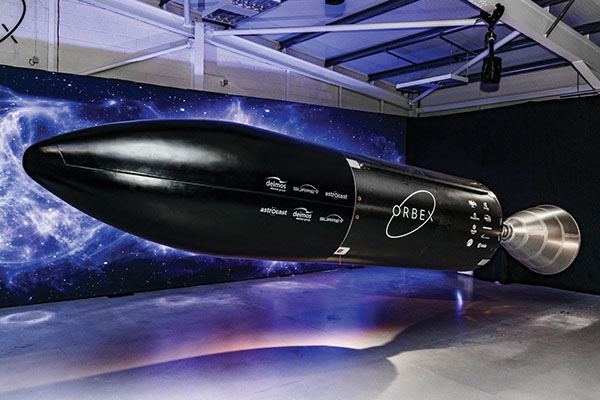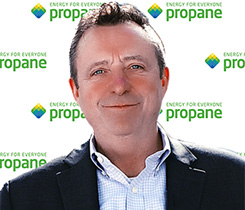Technology developments come to fruition for the propane industry
The propane industry is gaining significant ground on the technology front.
In an industry that is largely recognized as down-to-earth and traditional, favoring human-to-human interactions, there has been no shortage of innovation and cutting-edge technology developments.
With a growing number of people looking to alternative fuels to lower greenhouse gas emissions, propane offers a much-needed solution to myriad industries worldwide.
From propane-powered shipping vessels and space rockets to the importance of cybersecurity for small retailers, the world of LPG is bustling with innovation.
Propane as a marine fuel
One such innovation is the usage of propane as a fuel for maritime.

Propane meets all current global emissions standards when used as a marine fuel, according to the World LPG Association’s Nikos Xydas. Photo: bfk92/E+/Getty Images
According to Nikos Xydas, technical director of the World LPG Association, propane offers environmental benefits to the marine sector by meeting IMO 2020, a rule from the International Maritime Organization that from Jan. 1, 2020, the sector’s greenhouse gas emissions in international waters must be cut down significantly. To meet those goals, the marine sector will have to reduce sulfur emissions by more than 80 percent, to which propane offers a solution.
Xydas says propane meets all current global emissions standards when used as a marine fuel. Propane also requires a lower initial investment and simpler handling onboard when compared to liquefied natural gas (LNG).
The infrastructure required to convert marine vehicles and carriers to propane already exists, Xydas says. It is also a drop-in fuel, meaning it can replace LNG on existing ships without changing engines or other parts. Furthermore, renewable propane, also known as bioLPG, can be used in maritime to lower greenhouse gas emissions even more sharply.
Propane is not solely for large carriers in the marine sector. The alternative fuel can also be used in small, personal boats designed for leisure, outboard engines, lifeboats, small ships and short sea shipping boats, as well as tugboats and harbor and work vessels.
Propane-powered vessels are already making headway in the market. For example, BW LPG, a Singapore-based company that owns and operates 46 very large gas carriers (VLGC), unveiled the BW Gemini. The BW Gemini not only transports propane but is the world’s first VLGC to be retrofitted with a dual-fuel propane propulsion engine, the company says. In addition, BW LPG is retrofitting the BW Leo to feature the engine.
“LPG [presents] only advantages,” Xydas says. “It is a proven solution. It is simple. It is efficient. It is economical, and it is available everywhere around the world to be used in all types and all sizes of boats. With the coming of bioLPG, the environmental advantages become even more important.”
LPG engines
Several new propane engines are in the works for the coming years, according to the Propane Education & Research Council’s director of research and sustainability, Gokul Vishwanathan.
First is a 6.7-liter medium-duty engine that the industry aims to make available in 2024. It is a clean sheet engine that can surpass diesel in performance at significantly lower costs than diesel and compete in terms of efficiency.
“The engine has all the bells and whistles of the New Age technologies,” Vishwanathan says.
Vishwanathan is also researching Stirling engines, which are external combustion engines, rather than internal. Stirling engines contain regenerators, or heat exchangers, inside the engine that ultimately conserve heat from one cycle to be used in future cycles, according to American Stirling Co.’s official website. Stirling engines can be clean when it comes to burning because they do not contain an exhaust from inside the engine.
Vishwanathan says the council is currently looking at the telecom markets, as well as residential, light commercial and combined heat and power applications.
BioLPG-powered space rockets
Propane usage is taking off this year – in more ways than one.

Aerospace company Orbex is turning to renewable propane to power space rockets. Photo courtesy of Orbex
International aerospace company Orbex, which has headquarters in Scotland and additional locations in Denmark and Germany, is turning to renewable propane to power its space rockets.
Orbex builds small rockets that take satellites to low-atmosphere locations. According to Orbex CEO Chris Larmour, large rockets are significantly more efficient than small ones, which presented a problem that the company was determined to solve: How does Orbex increase its efficiency? The answer: propane.
Larmour explains that the company turned to LPG to power its rockets because of its unique physical property in that it does not freeze when chilled down to a similar temperature as liquid oxygen.
Traditional rocket micro launcher tanks are stacked with a kerosene fuel tank on top of the liquid oxygen tank, adding significant mass to the vehicle. Orbex adopted a different architecture called the Orbex Coaxial micro launchers, where the fuel is contained within a “jacket” of liquid oxygen. Propane can live in proximity with liquid oxygen without freezing, making it an ideal fuel for the coaxial tank.
By chilling propane to such low temperatures, Orbex is also able to densify the fuel and make it more efficient per cubic liter, Larmour says. Ultimately, propane’s usage reduces the structural mass of the vehicle by 30 percent.
“From a point of view of designing a rocket and making it work more efficiently and with high performance, this is a good system for us and this class of vehicle,” Larmour says.
In addition to the key benefits of increased efficiency and performance, Orbex opted for the alternative fuel due to its environmental impacts and commercial advantages.
Using renewable propane in place of kerosene lowers carbon dioxide emissions by 90 percent, according to Larmour. In addition, the fuel is non-coking, meaning the rockets remain clean after usage, reducing the extra amount of work required when reusing the engines in the next vehicle.
Furthermore, the cost of propane for rockets is 99 percent lower than the cost of conventional kerosene-based fuel, making it a much more economical choice for Orbex.
Hydronic heating
Most households in the country’s warmer regions have a heat pump with electric coils that offer warmth on moderate-temperature days. But when the temperature drops below 35 degrees and the pump’s electric coils turn on, residents are left chilly at best, says Armistead Mauck, vice president and owner of North Carolina-based propane retailer Cherry Energy.
Mauck and other retailers have been working with manufacturer Rinnai on what is known as hydronic heating, a system that offers a solution for colder days by incorporating a hot water heater that uses conduction to quickly heat the water. The hot liquid pumps through and heats the house during cold weather, including the flooring, leaving residents feeling warmer than they would with the “emergency heat strip” of traditional heat pumps.
“The benefits are comfort, cost and efficiency,” Mauck says. “Those three things are not applicable 365 days a year, but they are applicable in the cycling of the season.
“In southern states, we have a lot of shoulder-season temperatures in the fall and spring, and then we have short winters,” he adds. “Heat systems need to do it all by delivering registered temps that are not too hot when the outdoor temps are moderate, while at the same time being able to really crank the heat out when it drops below 35 degrees.”
With hydronic heating, the user only needs to adjust the water temperature, which changes the register’s temperature and what is coming out of it, he explains.
“If you want to really take it to the next level, integrate your technology and make the water temperatures variable, figure out what the temp is outside at the same time, and let it do all the thinking for you. Then the consumer can drive that system.
“What it does for us as propane marketers is it makes our value to the consumer that much higher because we delivered two solutions to their home in two critical solutions: a hot shower and a warm winter,” Mauck adds. “And that just screams comfort.”
Rinnai brought an air handler with hydronic fuel to the market as a multi-family housing solution. Developments for consumers were briefly slowed due to the pandemic, but Mauck hints that 2021 will be more fruitful to the single-family household hydronic heating market.
“Stay tuned,” he says. “In 2021, there will be a second announcement.”
Cybersecurity
Perhaps one of the most important steps a retailer could take to ensure smooth operations and positive customer experiences is invest in cybersecurity software.
Without the proper security measures, a hacker could potentially access sensitive information, jeopardizing both the business and its customers.
“At the end of the day, the most confidential information [retailers] have is people’s addresses and their credit card numbers,” says Marty Kirshner, a partner at Gray, Gray & Gray. “And all it takes is one hacker to break through the technology and compromise that data, which then will, in turn, force the retailer to have to basically tell all his or her customers that their data has been compromised.
“That could just cause a collapse of business,” he adds.
To prevent such an event, Kirshner recommends that all owners of retail propane operations perform an assessment on the company’s cybersecurity infrastructure. That would typically entail an IT professional to analyze the company’s current system and report on how it would weather a breach in security.
In addition, Kirshner urges retailers to train employees on what he refers to as “security awareness,” which includes learning how to spot bad emails. He recommends checking out cybersecurity training company KnowBe4, which offers short but comprehensive videos on the topic.
Retailers can also implement multi-factor authentication, which requires anyone who has access to company data to sign in with two forms of identification, typically a password paired with a phone number or security question.
“[A hacker] could get your password, but they might not have had your phone number,” Kirshner says. “So it creates an added level of authentication, which I think would be really important for back-office software.”
Kirshner also suggests that retailers look into IT cybersecurity programs such as Okta or Duo to enable multi-factor authentication.
Investing in cybersecurity won’t break the bank, and small businesses are more vulnerable than large corporations to a security breach, Kirshner explains.
“These are not expensive, little things to implement versus trying to overhaul your entire server,” he says.
COVID-19 a catalyst to adopt new technologies
In a recent LP Gas survey, we asked propane retailers: “Has COVID-19 led the company to use or consider the use of more digital processes and technology in daily operations to help employees and/or customers?”
Of the respondents, 40 percent said that yes, the coronavirus pandemic did in fact prompt them to use or consider using more technology to improve operations.
Some examples noted were the ability of customers to order and pay online; advertising on digital media; having customers sign digitally for work orders; and asking for Google reviews to enhance SEO performance. Others shared that tank monitoring and email address acquisition became a normal part of daily operations. With many employees working from home, several companies adopted virtual meeting platforms such as Zoom and GoToMeeting, as well.
Several respondents noted that their companies were already pursuing new technology to implement prior to the pandemic, but the onset of the virus and the need to go digital accelerated those efforts significantly.
















